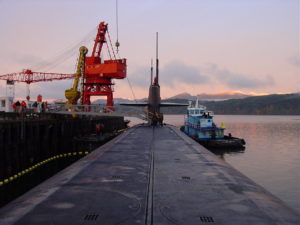 As a young economics student I was all for efficiency. So much so that if it could be proved that it was ‘efficient’ to send women and children down the mines – down they would have gone! But is economic efficiency to be our only criterion for evaluating government and infrastructure policy?
As a young economics student I was all for efficiency. So much so that if it could be proved that it was ‘efficient’ to send women and children down the mines – down they would have gone! But is economic efficiency to be our only criterion for evaluating government and infrastructure policy?
I thought of this when reading Leith van Oselin’s comment on the Federal Government’s submarine project. Writing in Macrobusiness as the ‘Unconventional Economist’, he nevertheless puts forward a very conventional economic argument. Using the release of the Productivity Councils’ 2014-15 Trade and Assistance Review as his starting off point, he argues: “Paying more for local builds, without sufficient strategic defence and spillover benefits to offset the additional cost, diverts productive resources (labour, capital and land) away from relatively more efficient (less assisted) uses. It can also create a permanent expectation of more such high cost work”. The article is titled “PC hits out at submarine pork”.
Our question today: Seems straightforward enough, doesn’t it? But is it?

There are always reasons for local builds, the difficulty is determining if cost differentials are equalled (or exceeded) by those reasons. Leith van Onselen argues they are not.
My observation is that the local build is not part of a national strategy, to reboot the naval construction or defence industry(s). That would warrant a significant premium.
Mark Thomson (senior analyst for defence economics at ASPI) points out that the number of jobs created in Australia is “a drop in the ocean” and that they are mostly “routine fabrication”. From that perspective a ‘local premium’ is not at all beneficial to the country.
From what I can see Australia is not benefiting in the areas of engine, propulsion, battery or weapons systems – these are all imported technologies. And as the technologies are imported, it is unlikely that there is a strategic advantage in local construction.
So :-
Is Australia receiving benefit from the local build – I’d argue yes.
Is Australia receiving good value from the local build – I’d argue no.
Is it “straight forward” – I’d argue no, what are the alternatives?
Good points. Yet is a national perspective (“a drop in the ocean”) the appropriate one to take? South Australia is currently experiencing severe unemployment problems as a result of the withdrawal of assistance to the car industry. To withdraw submarine construction at the same time would exacerbate this local problem.
Mark’s quote “On the scale of the 10-million strong Australian labor force, the promised 5500 or so [naval] shipbuilding jobs are a drop in the ocean”.
I think his point is that it is an expensive way to create jobs.
True. And it definitely is.
But perhaps a more important question from our perspective on infrastructure decision-making is “Why does Australia need submarines at all?” What is the chance that they will still be relevant when they are completed in 15 years time. What do we need to take into consideration? This was a subject taken up by The Conversation. You can find it at http://theconversation.com/why-does-australia-need-submarines-at-all-58575
While I could support some and criticise other principles espoused by Leith van Olsen and the Productivity Commission he cites, I confine this comment to consideration of the proposition that spending more to build in Australia, ‘diverts productive resources (labour, capital and land) away from relatively more efficient (less assisted) uses.’
If the boundary for analysis were to be drawn globally, I could accept the base proposition stated above. The Productivity Commission, however, continued by stating, ‘Such distortion detracts from Australia’s capacity to maximise economic and social wellbeing from the community’s resources.’ The Productivity Commission’s boundary for analysis shifted from global to Australia as a nation. This works only Australia has full employment presently and in the foreseeable future. But this is not so.
In this situation an appropriate analysis within the Australian economic boundary should compare the cost of an off shore purchase and consequential unemployment in Australia, with on the one hand with the higher cost of an on shore build and the benefit of improved ship building capability, including transferability of such capability to other industries.
I like to consider such questions in terms of ‘value for money’ at 3 levels:
1. ‘efficiency’ (more resources go into building them here)
2. ‘effectiveness’ (as per Penny’s comment, will they still be relevant in 15 years? are we realising the outcome we’re after?)
3. something that I’m struggling to define (Aristotle called it ‘eudaimonia’, the good life) that considers the outcomes of everything we do with our limited resources AND the way we do it (Aristotle’s ‘arete’, excellence – which also picks up on 1 & 2)… so in this context if an on-shore build results in better outcomes for the community in general (i.e. because of employment, etc.) than an alternative investment (cheaper off shore build + invest somewhere else or lower taxes) will, then it is the ‘right’ decision.
I suggest a story-based framework enables us to work towards an answer to #3 together… but at this (national) level that is a complex story! I think we can learn by applying such thinking at the local level first: e.g. is a local council better off sacking its workforce and employing out of town contractors?